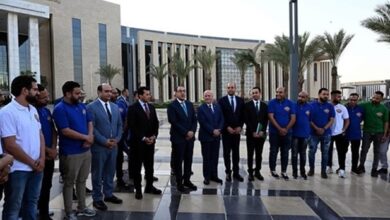Congratulations to the Muslim Brotherhood on the success of the Ramadan television series Al-Gamaa (The Brotherhood).
Written by the talented Waheed Hamed, the drama follows the life of Hassan al-Banna, the founder of the Muslim Brotherhood, from the colonial period all the way to the present. Hamed’s views against religious fundamentalism are well known, which, at first glance, may suggest the series is biased against the Brotherhood.
Upon closer examination, however, it becomes clear that not only is this series the best piece of work about the Islamist organization, but it has also helped promote the Brotherhood among segments of Egyptian society which the group had otherwise failed to reach over decades.
The Egyptian state has always been generous to the Brotherhood, perhaps because neither can survive without the other. The regime wants to stay in power and the Brotherhood wants to broaden its support and penetrate deeper into society, enlisting new members into its ranks. They consent to the regime staying in power and the regime leaves them the Egyptian public. A fair trade if there ever was one.
Once every five years the government has a gift for the Muslim Brotherhood–when it comes time for Egypt's parliamentary elections. During the 2005 vote, Egyptian TV aired a weekly program attacking the Brotherhood over five episodes. The aim of the program was to destroy the Brotherhood, but what ensued was in fact the opposite.
Preventing the Brotherhood from responding to these criticisms gained them public sympathy. This, combined with Egyptians' instinctual adoration of anyone attacked by state-owned media, led to the Brotherhood's electoral success that year as they won 88 seats in the People's Assembly for the first time. The TV program was never heard of again.
The magic of drama is that it unsuspectingly creeps into the public's consciousness. In Hamed’s sophisticated series, Brotherhood members appear as a group that, although violent at times, have a message and are willing to make sacrifices. While they also have flaws and make mistakes, most viewers respond to this depiction by asking, “Who doesn’t make mistakes?”
As a result, the series has increased consumer demand for al-Banna’s memoirs. Generations who knew nothing about al-Banna and who live amidst a society that reads very little are now interested in the founder's life. The series has succeeded in presenting the Brotherhood’s beliefs and their struggle with the regime to hundreds of millions of Arabic-speaking viewers.
When watching a TV drama, the viewer becomes emotionally involved with the characters portrayed; their sympathy with the characters may even cause them to ignore historical facts and events.
Thus people will forget the faults and iniquities of the Brotherhood, and all that will remain is their noble religious convictions. It's truly amazing that Egypt’s elite together with the current regime are oblivious to the Egyptian public's swing towards religion. In the end, the reality is that Al-Gamaa suits the public mood and leaves the Brotherhood quite content.
Translated from the Arabic Edition.




